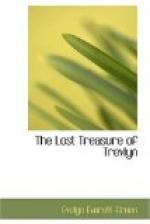“But thou hadst told her thy name?”
“Yes, verily, I had done that.”
“And knowing that, she divined all. Verily thou hast seen Esther the witch! And this was all she knew—this was all she knew!”
Joanna’s head was bent over the parchment. Her eyes were full of fire. Her words seemed addressed rather to herself than to Cuthbert, and they excited his ardent curiosity.
“And who is Esther? and dost thou know her? thou speakest as if thou didst.”
“All of us forest gipsies know Esther well. She is one of us, though she has left the forest to dwell in cities. According to the language of men, she is my aunt. She is sister to old Miriam, whom thou sawest in the forest mill, and who would have done thee to death an I had not interposed to save thee. And Miriam is my mother, albeit I am her queen, and may impose my will on her.”
“And does she know aught of the lost treasure?” asked Cuthbert, with eager impatience.
“I had hoped she did,” answered Joanna slowly, her eyes still bent on the paper. “I have seen her myself since I saw thee last. I have spoken with her on this same matter. I could not draw from her what I strove to do; but I see now that I prepared the way, and that when thou didst go by chance to her, she was ready for thee. But if this is all she knows, it goes not far. Still it may help—it may help. In a tangled web, no one may say which will be the thread which patiently followed may unravel the skein.”
“Belike she knows more than she would say,” suggested Cuthbert quickly. “If she can look into the future, sure she may look into the past likewise—”
But Joanna stopped him by a strange gesture.
“Peace, foolish boy! Thinkest thou if gipsy lore could unravel the riddle, that it had not long ago become known to me? We have our gifts, our powers, our arts, and well we know how to use them be it for good or ill. But we know full well what the limits are. And if men know it not, it is more their blindness than our skill that keeps them in ignorance. And if they give us more praise and wonder than we merit, do they not also give us hatred and enmity in like meed? Have we not gone through fire and sword when men have risen up against us and called us sorcerers? Have we not suffered for our reputation; and do we not therefore deserve to wear it with what honour we may?”
The woman spoke with a strange mixture of bitterness, earnestness, and scorn—scorn, as it seemed, almost of herself and of her tribe, yet a scorn so proudly worn that it scarce seemed other than a mark of distinction to the wearer. Cuthbert listened in amaze and bewilderment. It was all so different from what he had looked for. He had hoped to consult an oracle, to learn hidden secrets of which the gipsies had cognizance through their mysterious gifts; and, behold, he was almost told that these same gifts were little more than the idle imagining of superstitious and ignorant men.




